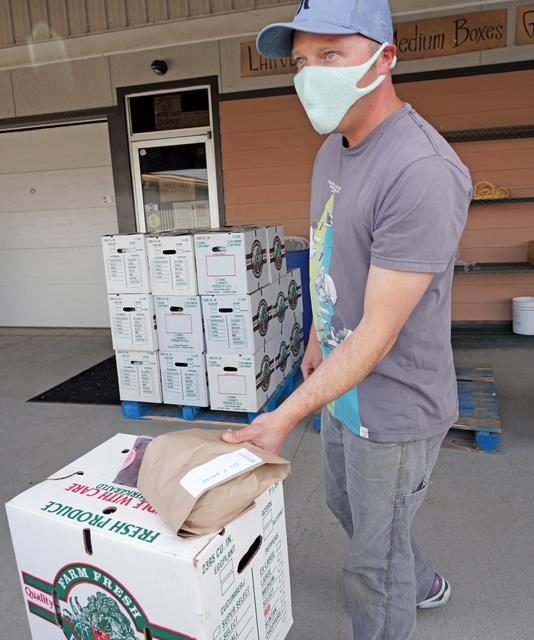Ann Arborites were early converts to the locavore movement. Ann Arbor Farmers Market manager Stefanie Stauffer, a farmer herself, says that by the late Aughts, many people here were buying locally grown fruits and vegetables directly from nearby farmers rather than in supermarkets.
But Stauffer, who wrote her PhD dissertation on local food systems, adds that the trend was relatively short-lived. “National corporations recognized what was happening and rebranded themselves as companies offering organic and locally grown products,” she says. They succeeded in luring many shoppers back to produce aisles.
Then Covid-19 hit. While the pandemic was disastrous for many businesses, says Ryan Padgett of Radicle Roots Community Farm, “This is a big moment for organic farmers who run small operations … The CSA model was planted before Covid, and it made sense then, but it will continue growing. I’m happy to be part of that movement.”
When rumors of a lockdown began circulating last spring, frantic shoppers emptied grocery store shelves, which were slow to refill. Meanwhile, the pandemic was decimating the labor force on megafarms in distant states and slowing the national transportation system. On top of those challenges, Governor Whitmer closed farmers’ markets, which were the main source of sales for many small local farms.
Local farmers responded immediately. Some changed crop varieties, some put more acres under cultivation, some chose vegetables over flowers, some built hoop houses and farm stands, and many quickly established an online presence. Meanwhile, shoppers searching for locally grown produce discovered, or rediscovered, community-supported agriculture (CSA).
“I learned that CSAs guaranteed that I would get a good assortment of fresh vegetables no matter what was happening in supermarkets,” says Betsy Waldheim, one of many converts. “I joined two different CSAs.”
—
CSAs are farmer-consumer partnerships, sharing both the risks and benefits of food production. At the start of the growing season, community members buy a share of a farm’s production and, throughout its CSA season (which can be as short as a few months or as long as a year), collect distributions of the farm’s produce, generally either weekly or biweekly. The arrangement offers farmers financial security and working capital, and consumers the first and best selection of the fruits and vegetables–as well as the satisfaction of knowing they are supporting local agriculture and local businesses.
“The CSA model has always made sense,” says Padgett, “pairing consumers with farmers to share the challenges and the rewards and harvests. But Covid showed the world why the CSA model works to everyone’s benefit.”
“Before last year, CSA farms had trouble filling their shares,” says Alexandra Cacciari, co-owner of Seeley Farm on Warren Rd. “That changed with the lockdown, when grocery stores were having trouble getting shipments and people wanted to avoid crowds.”
When farmers’ markets shut down, Richard Andres of Tantre Farm outside Chelsea predicted that local farmers would find innovative ways to sell their crops and that local shoppers would find plenty to eat–if they relied on their neighbors. “Farmers are the most adaptive people–they have to be,” he said at the time. “We’re used to adapting to climate conditions, market conditions, market demands, and crop conditions.”
He was right.
As soon as the lockdown was announced, CSA sales around Ann Arbor skyrocketed. “Last year, many more people came back to the idea of buying locally grown foods and keeping local businesses and neighbors afloat,” Stauffer says. “More and more people became aware of the fact that they can eat healthier foods while helping to save local farms and support local food businesses.”
Tantre is the grandfather of local CSA programs. Since 1993, Andres and his wife, Deb Lentz, have raised between eighty and 100 varieties of vegetables, fruits, mushrooms, herbs, and flowers, as well as cows and chickens, on 110 acres. They usually sell CSA shares into May, but last year, they sold out by the end of March, committing to 420 customers.
At Green Things Farm on Nixon Rd., Nate and Jill Lada’s variety of CSA subscriptions, including flowers, greens, and three seasons’ worth of produce, also maxed out. They hope this year to do even better.
“Small-scale farming here creates a close-knit community,” says Hannah Rose Weber, whose Land Loom grows salad greens, vegetables, herbs, and flowers. Last year, she joined with the Ladas and Ann Arbor Seed Company owner Eric Kampe to form the Green Things Farm Collective, creating a shared farm stand and an online ordering system open to other local food producers.
“I want to believe that Covid encouraged people to build new and permanent habits,” Weber says. “We saw amazing interest in locally grown produce last year, and it seems to be holding steady. People are realizing the value of supporting their local economy and eating fresh, minimally handled organic produce.”
—
Fourteen months after Michigan’s first shutdown, “the Ann Arbor Farmers Market is excited not to be closing,” Stauffer says. Tantre is just one of ten vendors there offering CSAs this year; customers pick up their boxes or bags at their farmers’ stalls or call for curbside pickup.
“CSAs didn’t cut into our vendors’ business. If anything, they help us,” Stauffer says. “When people come to claim their CSAs, they walk through the market and buy from other sellers.”
That’s also been the experience of Arbor Farms Market. Six years ago, the store pitched the idea of CSAs to its produce suppliers, most of them Amish farmers, all of them Michigan based. “They were happy to relinquish the sales, travel, and effort to man booths at farmers’ markets,” says Arbor Farms vice president Robert Cantelon. “Our customers come to support local farmers and small businesses: Michigan’s craft beers, fine wines, organic produce, grass-fed beef, organic pork, and deli-made foods prepared with local products, so they were open to CSAs–but last year our CSA sales doubled.”
Last year, an Andres family trust purchased a 160-acre farm at the corner of Zeeb and Scio Church Rds. Tantre is now converting its corn fields into orchards, fruit beds, and organic vegetable beds. And newcomers also are plowing and planting in the CSA field.
Adam Mitchel, a thirty-year veteran of the food industry, bought a longtime sheep farm in 2017 and established Country Valley Farm northeast of town. After initially selling his crops wholesale, he’s launching a CSA program this year. On two acres, he produces an impressive array of garlic, onions, asparagus, potatoes, culinary and medicinal herbs, and wildflowers, thanks to biointensive plantings and blow tunnels.
“Everything we do is by hand,” Mitchel says. “We focus on soil health, the best seeds, timing our plantings so the minute one crop is done, the next is in the ground.” To give his CSA members “a generous share and variety,” he has partnered with other farmers to expand his offerings. “We love food, and we want to become part of our local economy,” he says, “so our customers can connect a face with what they’re buying.”
Samuel Neupane’s is another new face. At the urging of his wife, Sumina, and with the assistance of a small federal grant, Neupane has turned his hobby garden into a business he calls Pakhabari–a Nepali term he translates as “small produce farm well attended near the house.” He hired Donald Schwartz to manage the thirteen-acre property on Ellsworth Rd., and together they’ve designed and built two geothermal-heated, high-tower houses. They plan to build four more this summer, and are in the process of getting organic certification.
“Last year changed everything in my life and career,” says Neupane, who previously worked in the computer field. “I spent a lot of time thinking about changes–in my life, in my career, and in our world. My family is so happy with this decision.”
Pakhabari’s CSA shares, packed in bushel-size tote bags, will start with microgreens in May and eventually feature seventy-five heirloom vegetables as crops ripen. Schwartz estimates they will be able to support 200 year-round shares the first year.
“It’s very exciting for us to become full-time farmers. It’s a new energy,” Neupane says. “The Covid news was so depressing, but there is nothing more energizing and exciting than watching plants grow and produce food. I believe this is the right time to enter the CSA market because people are spending more time in the kitchen cooking and feeding their families.”
—
The Green Things Collective and Country Valley represent a new kind of “hybrid” CSA that features locally canned or prepared foods as well as vegetables. “The state of Michigan is on a tear to develop and promote a cottage food industry,” says Arbor Farms’ Cantelon. “These days, Michigan farmers and small local businesses find it much easier to get licensing and sell directly to the consumer, circumventing brick-and-mortar stores. Michigan is becoming a food hub, and Covid-19 helped spur that process.”
CSA pioneer Tantre joined the hybrid movement last year with its Immunobooster program. It combines a week-by-week share of produce plus locally prepared foods–everything from maple syrup and honey to sauerkraut, homemade bread, desserts, quiches, tempeh, and salads.
“We’re not only promoting healthy eating but also local businesses,” says manager Ryan Poe. “Brick-and-mortar stores mark prices up thirty-five percent or more. Our margins are minimal.”
Last year the Immunobooster program averaged between 100 and 175 weekly shares, which translated into 4,500 to 6,000 pounds of produce each week. Over the course of its first year, Poe involved as many as thirty farms and farm-based businesses, everything from bakeries to brineries and local meat packers.
“It’s morphed into a local food club,” Poe says. “But we’re reaching a critical point now.
“Will Americans go back to their pre-pandemic pattern of buying, or have we convinced them of the merits of locally grown organic foods and the merits of supporting local farmers?”
Cantelon is optimistic. “The last year has seen a huge shift in the way we eat and entertain,” he notes. “People are learning to cook, and they’re buying the best ingredients.”
Land Loom’s Weber sees benefits for growers and consumers alike. “Small-scale regenerative farming is a business unlike any other,” she says. “It offers diversity of product, consideration of ecological systems, a personal touch, and community capital.”
—
from Calls & Letters, June 2021
“Your interesting article on CSAs made a mistake in its history,” Donna Wessel Walker emailed. “No mention of the Community Farm of Ann Arbor, which is the oldest CSA in Michigan, not Tantre. Also, CFAA pioneered the idea of offering prepared foods to members in the Community Farm Kitchen, which became Harvest Kitchen.”


